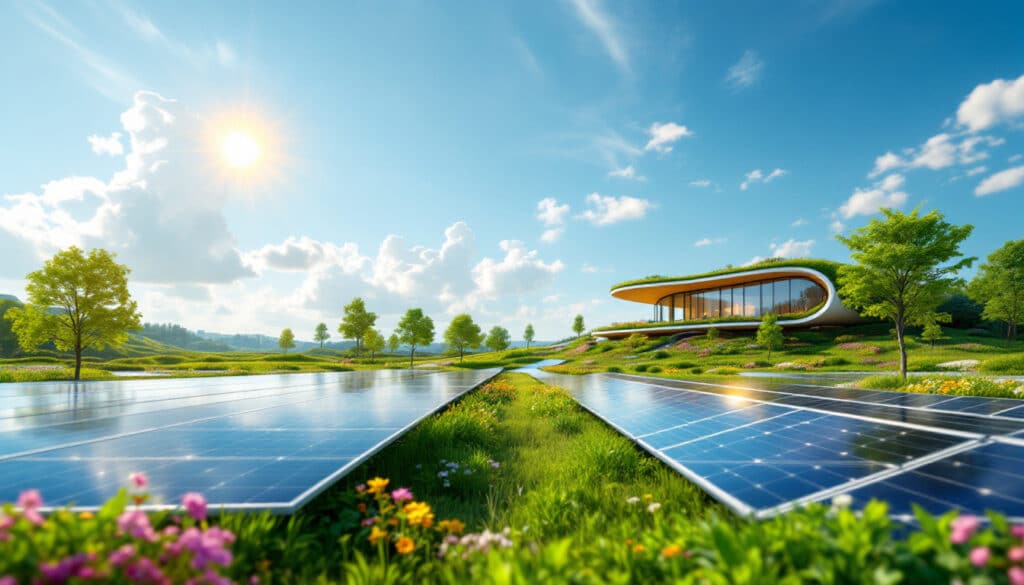Welcome to the fascinating world of solar energy, a renewable energy source that draws its potential from sunlight. Solar energy is distinguished by its two main forms of exploitation: photovoltaic, which converts light into electricity using solar panels, and thermal solar energy, which directly transforms solar radiation into heat. With the capacity to reduce greenhouse gas emissions and a nearly unlimited availability, this energy offers a true alternative to fossil fuels. Thanks to it, it is possible to produce not only electricity but also hot water and heating, while promoting sustainable development and reducing our energy bills. Today, solar energy occupies a prominent place in our quest for a more sustainable and environmentally friendly future.
Everything you need to know about solar energy: Glossary
Solar energy: Solar energy is a renewable energy that comes from the sun. It can be converted into electricity through photovoltaic panels or into heat through thermal solar technology.
Photovoltaic panels: These devices directly convert sunlight into electricity. They consist of photovoltaic cells that capture solar radiation to generate electric current. For a historical illustration, one can look to pioneers like Charles Greeley Abbot.
Thermal solar energy: This method harnesses the energy of the sun to produce usable heat for heating water or air in buildings. Unlike photovoltaic systems, thermal solar energy does not produce electricity but focuses on generating heat.
Self-consumption: Self-consumption refers to the use of electricity produced by a solar system for one’s own energy needs. This can significantly reduce dependence on conventional energy suppliers while lowering electricity bills.
Thermodynamic solar generators: A variant of thermal solar energy, they concentrate solar radiation to generate steam that then powers turbines producing electricity.
Greenhouse gases (GHG): Solar technologies significantly contribute to the reduction of GHG, as they require no combustion of fossil fuels to produce energy, thereby limiting CO2 emissions.
Profitability of solar panels: The profitability of solar energy depends on several factors, including the light intensity of the region, the orientation of the panels, and any government credits or subsidies offered for solar installation.
Integration of renewable energy: One of the major challenges for the future is to effectively integrate solar energy into existing electrical grids. Check essential measures for more details on this subject.
Innovation in solar: Numerous innovations are underway to improve the efficiency of solar panels and reduce their production costs. Initiatives such as the collaboration between EDP Renewables and Microsoft in Singapore demonstrate this progressive momentum.
Solar pioneers: Several prominent figures have shaped the evolution of solar energy, such as Abdou Moumouni Dioffo in Africa. These innovators have played a crucial role in the advancement and adoption of solar energy on a global scale.
Sustainable development: Solar energy offers a sustainable solution to energy problems, harnessing an abundant and non-polluting source. It is essential for achieving global sustainable development goals.
Overall, solar energy represents a promising alternative to traditional energy solutions, providing significant benefits for the environment and the economy. The rapid growth of this industry demonstrates its potential to play a central role in the future energy mix.

FAQ: Everything you need to know about solar energy
Q: What is solar energy?
A: Solar energy is a form of renewable energy produced from the sun, which can be transformed into electricity or heat using different technologies.
Q: What is the difference between photovoltaic solar energy and thermal solar energy?
A: Photovoltaic solar energy converts sunlight into electricity using photovoltaic panels. Thermal solar energy uses solar radiation to produce heat, which can be used to heat water or spaces.
Q: What are the benefits of solar energy?
A: Solar energy reduces greenhouse gas emissions, is an abundant and free energy source, and can help lower energy bills.
Q: How can solar energy be used in the home?
A: Solar energy can be used in the home for electricity production via photovoltaic panels, for heating water with thermal solar systems, and even for indoor heating.
Q: What are the costs and profitability of installing solar panels?
A: Costs vary depending on the size and type of installation. However, with feed-in tariffs and reduced energy consumption costs, installing solar panels can be a profitable investment.
Q: What is the environmental footprint of solar energy?
A: Solar energy has a very low environmental footprint as it involves no combustion, which limits greenhouse gas emissions.
Articles similaires
Thank you!
We will contact you soon.













